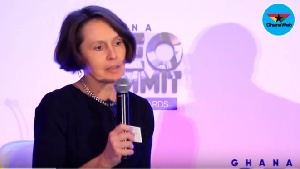IMF Country Representative, Natalia Kolandina has heaped praises on Ghana for the milestone it achieved in improving the fortunes of the country in economic terms.
She congratulated the current government for the bold decisions and initiatives taken since assuming office, crediting the leaders for the positive turn of events which made Ghana one of the fastest growing economies not only in the Sub-region but in the world.
The IMF Country rep also hailed the citizens for the corporation given the government and complying to their tax obligations which she believes is key in helping government drive the country on the right path.
Natalia Kolandina justified her praise for the government, noting that the successes chalked in 2017 did not come on a silver platter as government braved the odds and surmounted some herculean challenges.
Drop in interest rates, digitisation of the economy, steady progress to end the IMF programme, restoring macro-economic stability, restoring fiscal discipline, improved debt to GDP ratio, robust economic growth were some gains cited by the IMF Country rep to buttress her submission.
“Let me take this opportunity to congratulate the government and all of you for a very successful 2017 in terms of restoring macro-economic stability. I just want to add one more thing which is the fiscal discipline. The fiscal deficit was reduced from 9.6% of GDP in 2016 to 6% of GDP in 2017 and last year was the first time when government was able to record primary surplus which allowed debt to GDP ratio to decline so now, debt is on a declining path. This is a major achievement, of course, it did not come at zero cost, it had major impact on the economy at the same time the economy was growing at a very robust rate, one of the highest in Sub-Saharan Africa and in the world so this is a great beginning,” she lauded.
Natalia Kolandina was, however, quick to add that Ghana needs to do more to sustain this rate of growth and ensure it does not backslide to economic mismanagement.
She said though government’s vision of 'Ghana Beyond Aid' is noble, it is necessary to ensure that fiscal discipline is consistent and macro-economic outlook improve.
She said, doing this together with other initiatives of government will put Ghana on a path of growth even after the IMF programme has ended.
The IMF Country Representative added, “The focus now is ensuring macro-economic stability is maintained in the future, in the future outside the IMF supported programme. We, therefore, support the objective of moving Ghana beyond aid. What I understand by that is achieving macro-economic stability and at the same time maintaining high and sustainable rates of economic growth.”
Lending rates
The IMF Country Director expressed worry about the high lending rates in Ghana, explaining that it makes doing business in in the country difficult and stifles growth of the private sector.
She blamed the situation on rising levels of Non-Performing Loans owed the banks.
She suggested that the Bank of Ghana needs up its game even though some work is being done in relation to the reduction in policy rates.
“The Bank of Ghana is reducing the policy rates but lending rate is still quite high and the reason for that is the high levels of non-performing loans. What is this? This is a legacy issue which has accumulated over the years. I will say that the Bank of Ghana is taking decisive measures in a timely and orderly manner and we will look forward to the resolution and reducing nonperforming loans which will make banks lend to the private sector hopefully at lower rates,” Natalia Kolandina stated.
The IMF Country Director made these remarks at the 3rd edition of the Ghana CEO Summit held in Accra on Monday.
The 2-day event brought together captains of industries and heads of institutions to dialogue and exchange ideas on topical issues.
The event was also graced by the President, H.E Nana Addo Dankwa Akufo-Addo and Deputy Chief of Staff, Abu Jinapor.
Business News of Tuesday, 22 May 2018
Source: www.ghanaweb.com













